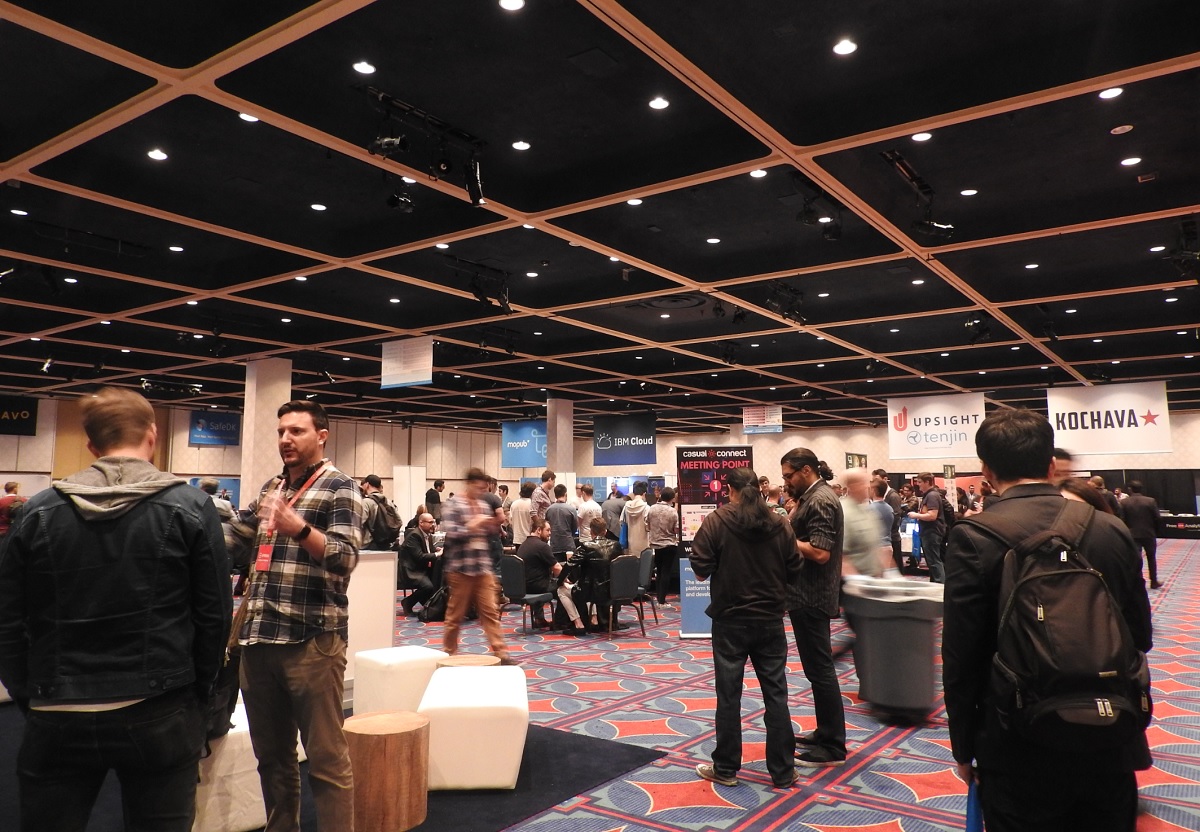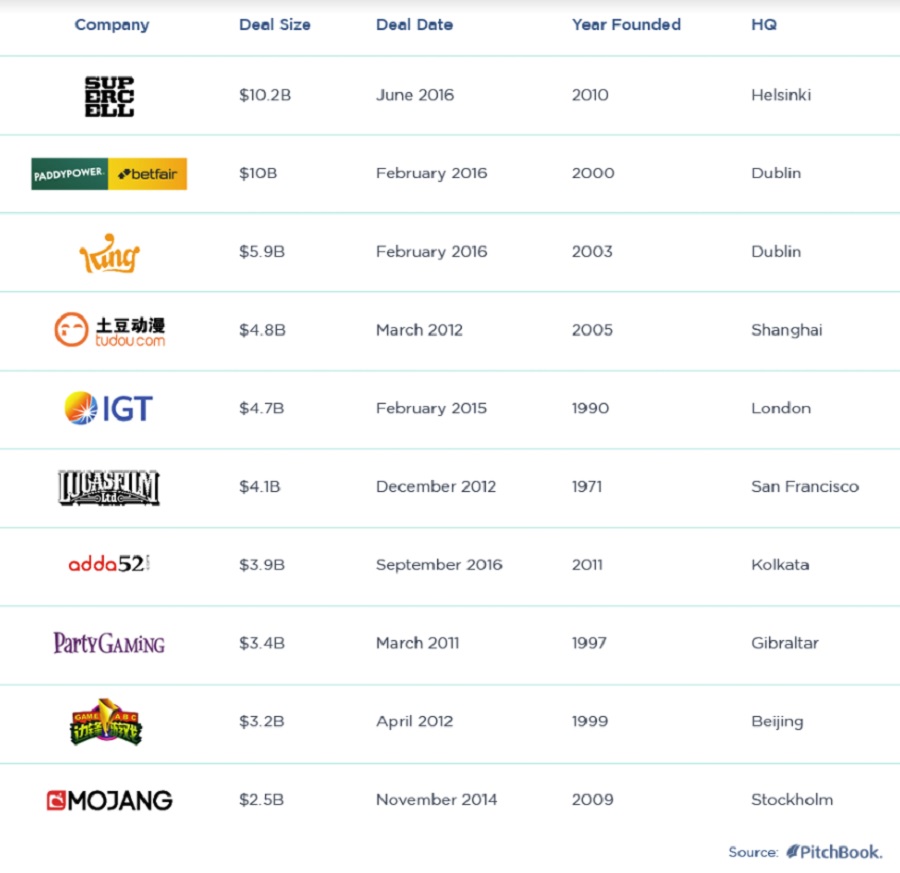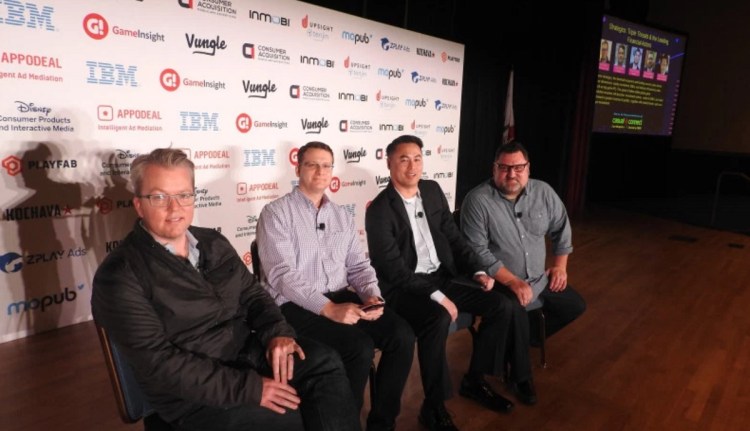testsetset
Is the next $10 billion game company acquisition right around the corner, or have all of the investors and acquirers moved on the more fruitful markets of Bitcoin, cryptocurrency, and blockchain?
Gaming has been around for a while, and it has grown into a $116 billion industry, according to market researcher Newzoo. It continues to have a rich cycle of startups, which grow up to disrupt bigger companies and then are acquired by the master strategists. Platform companies hover over the market, as they see gaming as a key to making their platforms more popular. Many different reasons drive acquisitions. So will game company mergers and acquisitions rise or fall?
I moderated a panel on that topic of acquisitions in the game industry at Casual Connect USA 2018 in Anaheim, California. The panelists included Scott Rupp, U.S. managing director for Modern Times Group; Shanti Bergel, executive vice president at FunPlus; Michael Chang, senior vice president for corporate development at NCSoft West; and Chris Heatherly, executive vice president of games and digital platforms at NBCUniversal.
AR, VR, and games adviser Digi-Capital estimates that game investment topped $2 billion in 2017. And games M&A in 2017 fell below $5 billion to its most recent low point of 2015 due to a lack of giant games acquisitions in 2017 (unlike 2016’s record of over $28 billion). Digi-Capital reported that the games IPO market rebounded to a record high last year led by Netmarble, SEA (Garena), and Rovio.
Here’s an edited transcript of our panel.

Above: The crowd at Casual Connect USA 2018.
Scott Rupp: I’m the U.S. managing director for Modern Times Group, which is a publicly-traded European media company based in Stockholm, with about $2 billion in revenue and a $3 billion market cap. A third of our business is digital, and the balance is TV. Within digital we’re very active in gaming, esports, and digital video. In gaming we own Kongregate and InnoGames, and in esports we own ESL and Dreamhack.
Shanti Bergel: I’m the EVP for a company called FunPlus. FunPlus was a startup. We raised about $75 million in venture capital, and then had an exit event. We sold, in an asset sale, our casual games division for $1 billion to a Chinese company in 2016. We still retain our mid-core game portfolio, and we’re a fully independent company now. The asset sale liquidated our investors. The entire company is now owned by the two founders.
We have our mid-core game portfolio, which includes a game called King of Avalon, which is one of top 20 grossing games in the world. We’re now investing in other companies in an area we call digital entertainment, which includes games, but isn’t limited to them. For example, we’re an investor in an esports team called Cloud 9, and we’re investor and part operator in a mobile streaming company, as well as some other content plays in digital entertainment.
Michael Chang: I work at NCSoft, one of the world’s largest publicly traded game companies. We’re best known for PC MMOs, but recently we’ve had success with mobile products. The mobile Lineage, which launched in Korea alone, did about $700 million in six months. I do investments and acquisitions for the company. We’re looking for people to back. Before this I used to do M&A for Electronic Arts, along with Shanti here.
Chris Heatherly: I’m EVP of games at NBC Universal. We’re out of the Universal Studios group. I came to Universal to help transition our model from primarily licensing over to publishing. I spent the last year building a team and working with developers in order to develop games with our IP that we can publish. In addition to that, I advise, within the company, on other things that touch the games industry – things like VR, esports, investments through things like Comcast Ventures. I touch all of those things, at least as an advisor.

Above: DLink showed off wireless VR via WiGig technology.
GamesBeat: This is about acquiring game companies. Earlier this morning, Eric Goldberg moderated the session on investing in game companies. I was curious what you guys think about what’s hot for investments now, particularly because that’s the beginning of the eventual acquisition process. We’ve gotten a good sense that VR is cooling down, but esports is heating up. That’s the general vibe. Scott, did you have any other takeaway from that session?
Rupp: Certainly esports is hot. As we think about areas to invest in for our venture fund, it is focused on esports and gaming. We’re interested in certain sub-themes within those categories. In esports we’re looking at mobile esports and analytics and analogous pieces to other pieces of the traditional sports ecosystem.
For gaming, we think there’s a huge hole in the market to back developer-publishers. There’s a lot of value to be created there. There’s a healthy VC market in Europe, but not as many active investors here in the states. We see a gap there. But we’re looking at every evolution in publishing. We’re looking at alternative ways to drive discovery, alternative ways to finance games, alternative ways to market games. There’s a lot of fertile ground across the space.
Bergel: Our take on investments — at a very high level, in terms of maturity, mobile for example is quite mature. We’d be more likely to acquire proven quantities in mobile than we would in an environment like instant gaming or games for voice on Echo or Google Home. Those are areas where we see people attempting to build new businesses now and it’s an interesting place to invest.
Typically, as an investor, you think about the early stage, where new markets might grow, but we’re not quite ready to jump in there with our internal development studios, which are committed to more mature businesses. For example, King of Avalon, that’s a standing dev team of some size. We can’t easily just take them off that, because it’s a very large revenue driver for us. It’s incumbent upon us, if we want to participate in some of the new platforms that are up and coming, to work with folks that are outside the company and invest in their ideas and try to identify places where we can be helpful to people who are developing what might be a next-generation business.
Chang: By a show of hands, how many of you would be excited to start a new mobile gaming company now? Just a few hands. That’s boundless optimism there. Number two, how about starting a new PC or console game studio? Facebook instant games? Games for Amazon Alexa or Google Home? Interesting. How about AR? Mixed reality? Pretty brutal right now. It’s an interesting indication.
I think there’s an interesting dynamic going on here. The gaming market have never been larger since I joined in 2010. Everyone’s a gamer. Everyone has a phone right now. But the opportunities for independents are a lot more interesting, shall we say, than when we started these conferences in Seattle. In 2010 there were all the games from Big Fish, all the PC client downloadables. That’s all gone to Facebook and free-to-play mobile. New Xbox, new PlayStation, VR came and did one of these. We’re all looking for something in AR, Facebook Instant, audio games.
These are the biggest markets ever, but it’s also the most challenging. We’re all looking for the new area. We don’t have that next platform. It’s changing the dynamics of what kinds of deals we do right now and the types of things people should be working on, at least in the short to medium term.

Above: VY Esports wants to match brands and esports events.
Heatherly: I’m a little more bullish. I feel that the investor community is ultimately too bearish on the whole market. It’s the biggest, most monetized game market that there’s ever been. Everyone in the world is playing games now. If you look at companies like Playrix, there are probably four or five new entrants in the top 20 grossing every year.
I think the challenge with free-to-play games on mobile is that there are very few people that are going to do it well. You have to do a lot of things right. You have to build the infrastructure. The investments are significant, and then there’s the UA expense. Good teams that are good at free-to-play are breaking through and making a lot of money. But that’s an admittedly small number of companies given the difficulty factor.
The Instant Games market is very interesting, although I worry about the — there’s going to be a lot of casualties there if the platform dies. Facebook is going to make the economics challenging. How many people here have played Facebook Instant Games? What’s driving the market is what drove the early Facebook web games. If Facebook ever throttles back the virality like they did on Canvas they can kill that market overnight, which has to make one a little bit nervous.
Long term, even VR, I’m not ready to count that out. It’s going to be several years, but people just need to buy headsets. The barrier to entry, the cost, the complexity of systems—when we start getting into six degrees of freedom and wireless headsets, we’ll start to see if that’s a market or not. But there are more ways to play games than ever before, and new ways to make games are being invented, like HQ. For those who haven’t seen it, HQ is a game show that’s livestreamed. These guys are getting more than a million concurrent players right now, MMO-sized numbers. The appetite for games is endless. The challenge is in marketing and user acquisition, but there’s no better time to make games, in my opinion.
Bergel: Just to nuance that point, I agree that there are amazing opportunities in the space. However, if you look at the companies that are making conventional plays, Playrix is an old company. It’s not a company that came in last year and jumped to the top of the charts. The presentation right before we came on, about Game Insight—a super compelling story, the success of Guns of Boom. But Game Insight is also not a new company. Our company was founded in 2010 and we had a huge exit. But we’ve been working at this for a long time.
To start a mobile game company right now, as an investor, I would worry about that. I would think, okay, how far do you have to go to be market competitive with the people who are up here right now? What are you bringing to the table? If you used to work at Supercell or EA or Machine Zone, those are all good things, but how fast can you come up to speed from a live ops perspective and beat the guy next to you?
Chang: We have to be very creative now. Whether it’s influencers or esports, creating something to drive discovery, or something to drive more customer acquisition, we have to be very clever now. We have to have some unique differentiation. We’re having to be stock pickers, versus just betting on the stock market.

Above: Dan Fiden, chief strategy officer at FunPlus.
GamesBeat: I interviewed Dan Fiden back in February of 2016. I’m curious how some of the thinking may have changed since then. At the time he was saying everyone else was swimming in the same direction, into new platforms that have zero penetration like VR. He wanted to take his $50 million fund and invest it in mobile games. But it seems like now that’s not an automatic strategy for you guys.
Bergel: In 2016 that was more of a reasonable thing to say. But even so, it is being said from the point of view of a company that has a lot of resources to bring to bear. Why would you take money from FunPlus in 2016? Because we know a lot about certain aspects of the mobile market. We can add a lot of value from an operations perspective. What a lot of western developers are missing when they come to this market — there’s an understanding of LTV, an understanding of live operations, an understanding of how to arbitrage CPI and LTV effectively. Those are things that FunPlus, in an internal analysis, thought we could bring to bear as far as being a good partner to companies that might be coming up.
Full disclosure, everyone who came through that door got measured alongside the same criteria we’d use for an internal studio. It’s a competitive filter. It’s not an act of charity to establish a $50 million fund and say, “Hey guys, let’s go make some games.” The investment criteria for a nascent category are much more relaxed. It’s much more about exploration and R&D. Whereas in a fully developed category, where we can see all the numbers on AppAnnie, it’s a different thing. That’s why we as a company look at acquisition for that bucket as opposed to investment.
GamesBeat: One point is that this is a very fast-evolving thing. Your thinking in different sectors is often changing.
Bergel: For sure. Two year is an eternity in mobile.
Chang: To that point, in gaming right now, people capture very quickly. I grew up in the world of venture capital, where you’re trying to invest in small, but rapidly growing markets, so when the larger guys come in you can defend that position.
We talked about Facebook Instant Games today. Zynga is there. They haven’t missed this one. They have Words with Friends in there. There are large guys in that market, because they’ve seen the virality that they remember from the Facebook Canvas days. They’re not seeing the retention, but they’ll see ad monetization and in-app purchase monetization coming up. They’ll see combinations of chat bots and other things that make games more immersive.
We’re asking and encouraging you, because we’re all investors here, to find those undiscovered and untapped markets, where you can be a leader in a small, but ideally long-term market in the future. If you can find those and defend that position, you’ll have something of great value that someone can pay you for or fund you for in the future.

Above: Pitchbook’s list of the biggest game and gambling industry deals.
GamesBeat: Chris, you know about changing patterns in the business from your previous experience at Disney. There’s almost a cyclical pattern to Disney’s interest in games.
Heatherly: For entertainment companies, our view at Comcast Universal is that Comcast started off as a cable company. It’s become a broadband company. The people in the company know what’s going down those pipes is what’s growing broadband views. Some of it is streaming video, but a lot of it gaming. We have a management team that has a very progressive view toward the games business.
We’re heavily invested in traditional media assets already. We have a lot of capital, but we’re in search of something new. One of the things that I think is attractive to our company is that games are adjacent to both the things we do in the cable business and the things we do in the entertainment side of the business. It’s a new media business we’ve found. That’s the opportunity for us.

